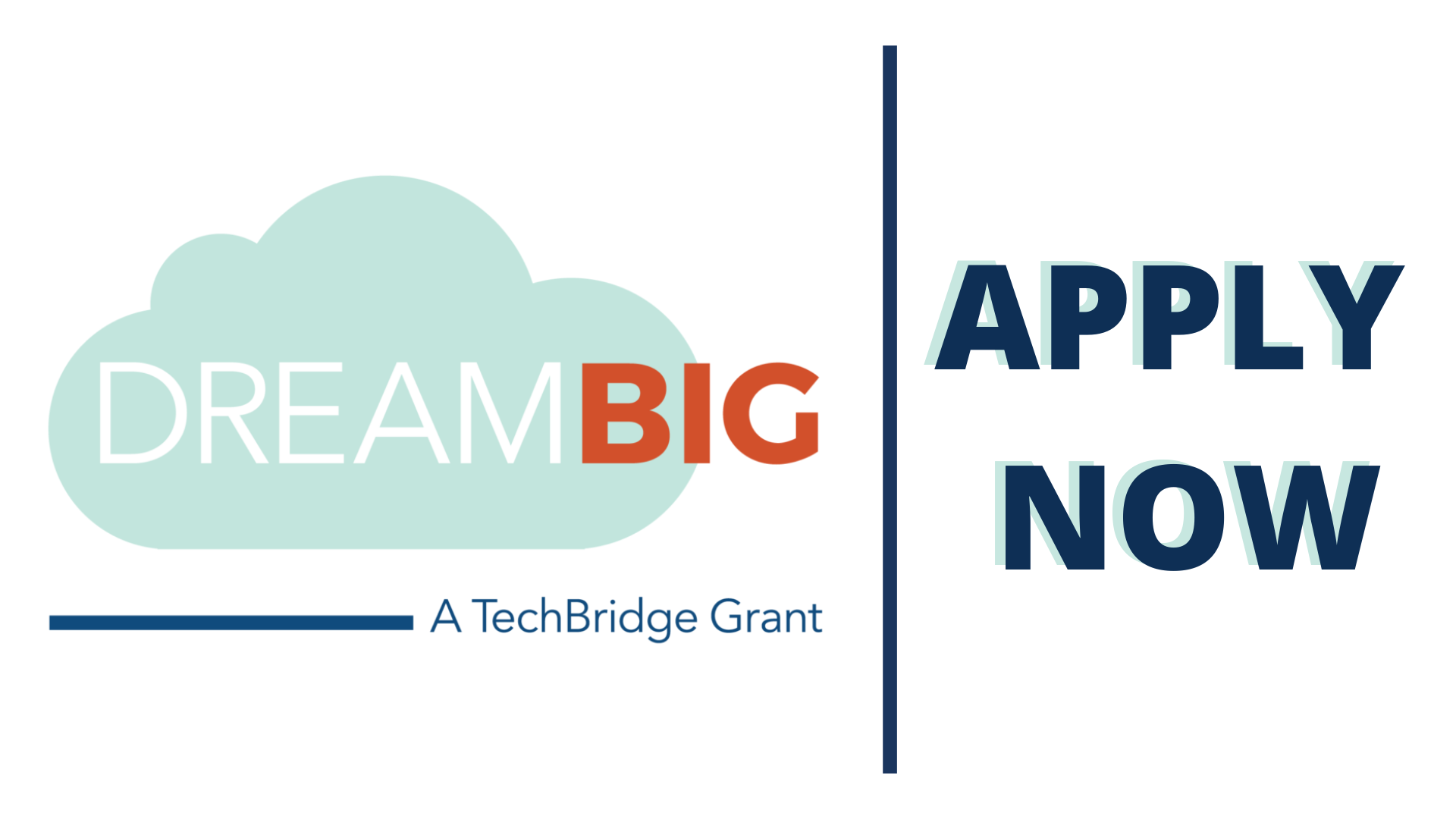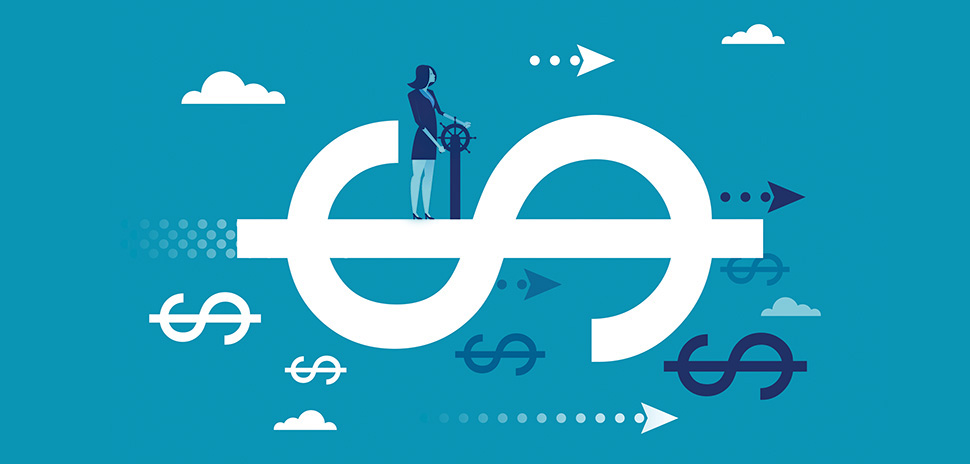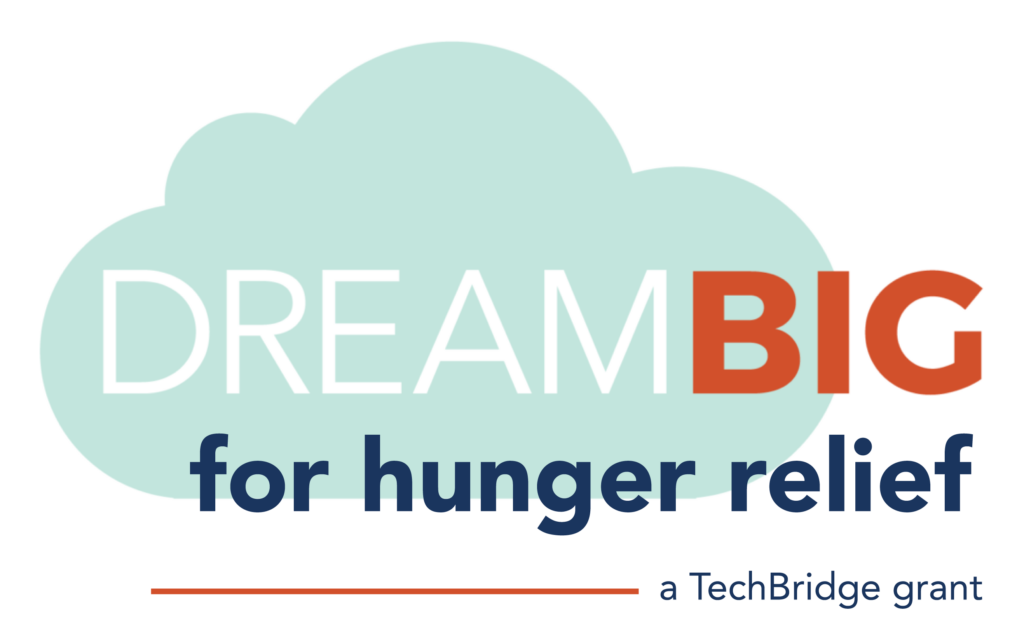Grants for Nonprofits
Thank you for your interest in the Dream Big Grant. We are not currently accepting grant applications. We will update this page if a new grant opportunity arises.
Thank you.
Dream Big™ Grant
How can your organization utilize technology to work with TechBridge to break the cycle of generational poverty?
Our Dream Big™ Grants were created to help nonprofits apply creative technology solutions to their organizations.
Technology has the potential to transform the operations of shelters, food pantries, workforce development programs, and so much more.


Many nonprofits struggle with optimizing their client-facing services due to a backlog of manual administrative work, but technology can expedite these processes.
Each Dream Big™ Grant gives organizations in our four pillars the opportunity to leverage technology for simplified client onboarding, tracking client journeys and outcomes, donor management, and measuring mission impacts.
This series of grants is one of the few grant opportunities focusing on nonprofits obtaining and using software technologies (plus IT hours) to help fulfill their missions.
Current Opportunities
Dream Big™ for Hunger Relief
Applications are open and officially close on:
We will notify the applicants regarding our final choice during the week of

This Dream Big™ Grant is open to hunger-relief-focused nonprofits with more than five full-time employees.
Start thinking about how data and technology can grow the impact of your hunger-relief nonprofit. Our experienced TechBridge teams will evaluate your idea to estimate costs.
Thanks to Our Generous Dream Big for Hunger Relief Grant Sponsor, Verizon
Why Dream Big?
We’re glad you asked! We have a podcast about that — or you can watch the video below.
Dream Big for Hunger Relief: Eligible Organizations
- The organization is a 501(c)(3) charitable organization as defined by the Internal Revenue Service
- The nonprofit organization must be classified by the U.S. Internal Revenue Service under Section 501(c)(3) of the I.R.S. code as a nonprofit, tax-exempt organization, donations to which are deductible as charitable contributions under Section 170 (c)(2), and the I.R.S. determination must be current
- Nonprofit organization must have a minimum two-year operating history after the date of receipt of its 501(c)(3) classification
- The organization is focused on Hunger Relief
- Hunger relief advocates
- Food banks
- Food pantries
- Food rescue organizations
- Community gardens
- Urban farms
- Nutrition & wellness organizations
- Grocery stores
- Food vendors
- Food donors
- Ineligible Organizations
- Private and publicly funded school K – 12 schools and institutions of higher learning. This does not include nonprofit charter schools
- Organizations that exclusively raise funds for publicly funded schools (K – 12), institutions of higher learning, and/or government agencies
- Organizations that require participation in religious services and/or education as a condition of receiving services
- Organizations that have discriminatory policies and/or practices on the basis of race, color, national origin, age, disability, sex/gender, marital status, familial status, parental status, religion, sexual orientation, genetic information, or political beliefs.
- Organization Details
- The nonprofit organization must have at least five (5) full-time paid employees or Full-Time Equivalents (FTE), paid minimum wage or more, working at least 35 hours per week or two employees working a combined 35 hours per week, all classified as a W-2 employee for the 12 months prior to submitting an application (please note that contractors or consultants do not count toward this requirement)
- The nonprofit organization must have annual operating expenses greater than $2,000,000 as reflected in the most recently filed I.R.S. Form 990
- The organization follows EEOC guidelines and provides equal employment opportunities to all persons regardless of age, color, national origin, physical or mental disability, race, religion, creed, gender, sexual orientation, marital status, status as a disabled veteran, or any other characteristic protected by federal, state or local law
AgencyExpress Giveaway
Are you a Feeding America Network member food bank? Would you like to make food ordering simple and efficient? TechBridge will host a drawing of Dream Big Grant applicants to select eligible food banks to receive complimentary AgencyExpress4 services. The AgencyExpress platform is a web-based shopping tool enabling Feeding America Network member food banks to list their inventories online.
TechBridge and Feeding America will launch the latest iteration of AgencyExpress (AgencyExpress4) in . AgencyExpress4 works with any food bank ERP platform by leveraging modern application programming interfaces and web services solutions for real-time data sync.
Benefits
- View real-time inventory
- Reduce order fulfillment disruptions
- Control order frequency for individual agencies
- Enhance pickup & delivery scheduling
AgencyExpress4’s brand-new user interface is browser-independent and mobile- and tablet-friendly.
Eligibility
To qualify, your food bank must:
- Apply for the Dream Big for Hunger Relief Grant
- Be a member of the Feeding America Network
Current users of the AgencyExpress platform are ineligible.
Dream Big Grant: Past Winners
Tech Assessments
Gateway Center addresses the underlying barriers that prevent individuals and families from transitioning out of homelessness, such as unemployment, behavioral health, housing affordability, and/or medical conditions. They provide a trauma-informed and client-centered environment where individuals can receive the tools they need to end their homelessness and achieve self-sufficiency.
“Big Winner”
Legal Aid at Work provides free legal services organization assisting low-income working families for more than 100 years. They use 4 main strategies to enforce and strengthen workers’ rights.
- Clinics & helplines
- Legal information
- Litigation
- Policy advocacy
Tech Assessments
YWCA Central Alabama is dedicated to eliminating racism, empowering women, and promoting peace, justice, freedom, and dignity for all.
Through the years, YWCA assisted young women in their search for employment (1900s), elevated teen service (1930s), and created opportunities during times of turbulent race relations for Black and white women to plan and develop programs together (1960s).